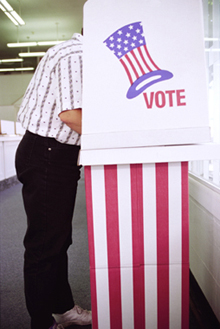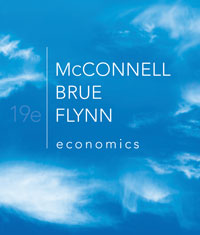Economics (McConnell) AP Edition, 19th EditionChapter 17:
Asymmetric Information, Voting, and Public ChoiceOrigin of the Idea <a onClick="window.open('/olcweb/cgi/pluginpop.cgi?it=gif::::/sites/dl/free/0217511447/124310/origins_image.gif','popWin', 'width=70,height=90,resizable,scrollbars');" href="#"><img valign="absmiddle" height="16" width="16" border="0" src="/olcweb/styles/shared/linkicons/image.gif"> (1.0K)</a> <a onClick="window.open('/olcweb/cgi/pluginpop.cgi?it=gif::::/sites/dl/free/0217511447/124310/origins_image.gif','popWin', 'width=70,height=90,resizable,scrollbars');" href="#"><img valign="absmiddle" height="16" width="16" border="0" src="/olcweb/styles/shared/linkicons/image.gif"> (1.0K)</a> | 17.1 Information Failures |  <a onClick="window.open('/olcweb/cgi/pluginpop.cgi?it=gif::::/sites/dl/free/0217511447/124310/origins_image.gif','popWin', 'width=70,height=90,resizable,scrollbars');" href="#"><img valign="absmiddle" height="16" width="16" border="0" src="/olcweb/styles/shared/linkicons/image.gif"> (1.0K)</a> <a onClick="window.open('/olcweb/cgi/pluginpop.cgi?it=gif::::/sites/dl/free/0217511447/124310/origins_image.gif','popWin', 'width=70,height=90,resizable,scrollbars');" href="#"><img valign="absmiddle" height="16" width="16" border="0" src="/olcweb/styles/shared/linkicons/image.gif"> (1.0K)</a> | 17.2 Public Choice Theory |  <a onClick="window.open('/olcweb/cgi/pluginpop.cgi?it=gif::::/sites/dl/free/0217511447/124310/origins_image.gif','popWin', 'width=70,height=90,resizable,scrollbars');" href="#"><img valign="absmiddle" height="16" width="16" border="0" src="/olcweb/styles/shared/linkicons/image.gif"> (1.0K)</a> <a onClick="window.open('/olcweb/cgi/pluginpop.cgi?it=gif::::/sites/dl/free/0217511447/124310/origins_image.gif','popWin', 'width=70,height=90,resizable,scrollbars');" href="#"><img valign="absmiddle" height="16" width="16" border="0" src="/olcweb/styles/shared/linkicons/image.gif"> (1.0K)</a> | 17.3 Paradox of Voting |
 <a onClick="window.open('/olcweb/cgi/pluginpop.cgi?it=gif::::/sites/dl/free/0217511447/124310/origins_image.gif','popWin', 'width=70,height=90,resizable,scrollbars');" href="#"><img valign="absmiddle" height="16" width="16" border="0" src="/olcweb/styles/shared/linkicons/image.gif"> (1.0K)</a> <a onClick="window.open('/olcweb/cgi/pluginpop.cgi?it=gif::::/sites/dl/free/0217511447/124310/origins_image.gif','popWin', 'width=70,height=90,resizable,scrollbars');" href="#"><img valign="absmiddle" height="16" width="16" border="0" src="/olcweb/styles/shared/linkicons/image.gif"> (1.0K)</a> | 17.1 Information Failures |
While information has always had economic value, George Stigler (1911-1992) was the one who brought it to the forefront of analysis. In his 1961 Journal of Political Economy article, "The Economics of Information," Stigler asserts that information is an economic good and, like all goods, consumers weigh marginal benefits and marginal costs to determine how much to acquire.
Educated at the University of Washington (B.B.A.), Northwestern University (M.B.A.), and the University of Chicago (Ph.D.), Stigler taught at Iowa State, Minnesota, Brown, and Columbia Universities, and eventually joined the famous Chicago school of economics. The Chicago school represents the more conservative mainstream in economic thought. As such, it is believed that free markets are the best mechanism for allocating resources, and that negative economic outcomes do not stem from flaws in the market, but from poor decisions made with faulty or incomplete information.
|  <a onClick="window.open('/olcweb/cgi/pluginpop.cgi?it=jpg::::/sites/dl/free/0217511447/124320/origin30_3.jpg','popWin', 'width=430,height=325,resizable,scrollbars');" href="#"><img valign="absmiddle" height="16" width="16" border="0" src="/olcweb/styles/shared/linkicons/image.gif"> (97.0K)</a> <a onClick="window.open('/olcweb/cgi/pluginpop.cgi?it=jpg::::/sites/dl/free/0217511447/124320/origin30_3.jpg','popWin', 'width=430,height=325,resizable,scrollbars');" href="#"><img valign="absmiddle" height="16" width="16" border="0" src="/olcweb/styles/shared/linkicons/image.gif"> (97.0K)</a> |
The adverse selection problem and lemon example comes courtesy of George Akerlof (b. 1940) of the University of California at Berkeley. As the lemon example illustrates, sometimes buyers lack information, leading to adverse selection. Sometimes sellers lack relevant information, such as insurance providers who lack full knowledge of their clients' behaviors and probabilities of loss. In any case it is insufficient information that causes market failure.
Photograph courtesy of: (c)Photodisc # BU002335;
 <a onClick="window.open('/olcweb/cgi/pluginpop.cgi?it=gif::::/sites/dl/free/0217511447/124310/origins_image.gif','popWin', 'width=70,height=90,resizable,scrollbars');" href="#"><img valign="absmiddle" height="16" width="16" border="0" src="/olcweb/styles/shared/linkicons/image.gif"> (1.0K)</a> <a onClick="window.open('/olcweb/cgi/pluginpop.cgi?it=gif::::/sites/dl/free/0217511447/124310/origins_image.gif','popWin', 'width=70,height=90,resizable,scrollbars');" href="#"><img valign="absmiddle" height="16" width="16" border="0" src="/olcweb/styles/shared/linkicons/image.gif"> (1.0K)</a> | 17.2 Public Choice Theory |
The founder of public choice theory is James M. Buchanan (b. 1919). Born and raised in poverty in rural Tennessee, he worked his way through Middle Tennessee State College. The hardships of the Great Depression kept Buchanan from studying law and Vanderbilt University, but in 1945 he was finally able to begin graduate work in Economics at the University of Chicago. After completing his Ph.D., Buchanan taught first at the University of Virginia, then at Virginia Polytechnic Institute, where he helped organize the Center for the Study of Public Choice, and created the Journal of Public Choice. He finally moved to George Mason University, moving the Center with him. Buchanan received the Nobel Prize in Economics in 1986 for his groundbreaking contributions to public choice theory.
Buchanan belongs to a group known as welfare economists. Welfare economists are concerned with maximizing social well-being, and focus on such things as redistribution policies and voting (decision) rules. Buchanan focused on the latter. As part of creating public choice theory (also known as the economics of politics), he also developed constitutional economics (the economics of rules).
Buchanan was not alone in his work on public choice theory. His groundbreaking work The Calculus of Consent: Logical Foundations of Constitutional Democracy, he co-authored with Gordon Tullock (b. 1922) at the University of Virginia. Together they advanced public choice theory by incorporating rent-seeking behavior, interest groups, and voting rules.
Swedish economist Knut Wicksell (1851-1926), though recognized primarily for his work in monetary economics, contributed to Buchanan's ideas through his 1896 dissertation on taxes. Wicksell argued that only a unanimous collective choice can guarantee that a public policy action will result in a just and efficient outcome. This is today referred to as a unanimity rule. According to Wicksell, if a policy action "holds out any prospect at all of creating utility exceeding costs, it will always be theoretically possible, and approximately so in practice, to find a distribution of costs such that all parties regard the expenditure as beneficial and may therefore approve it unanimously."(1)
The philosophy underlying Buchanan's public choice theory is that only individuals know what provides them utility or creates disutility. While individuals vary in such things as ability, information, and tastes, they all pursue their own self-interest. Classical economists such as Adam Smith argued that the pursuit of economic self-interest would create a harmony of interests in the market place. Buchanan extended the principle to political self-interest and to identifying mechanisms by which a harmony of political interests (primarily in terms of economic policy actions) could be achieved.
- Knut Wicksell, "A New Principle of Just Taxation," translated by James M. Buchanan, in Classics in the Theory of Public Finance, eds. Richard A. Musgrave and A.T. Peacock (London: Macmillan, 1958), pp. 89-90.
 <a onClick="window.open('/olcweb/cgi/pluginpop.cgi?it=gif::::/sites/dl/free/0217511447/124310/origins_image.gif','popWin', 'width=70,height=90,resizable,scrollbars');" href="#"><img valign="absmiddle" height="16" width="16" border="0" src="/olcweb/styles/shared/linkicons/image.gif"> (1.0K)</a> <a onClick="window.open('/olcweb/cgi/pluginpop.cgi?it=gif::::/sites/dl/free/0217511447/124310/origins_image.gif','popWin', 'width=70,height=90,resizable,scrollbars');" href="#"><img valign="absmiddle" height="16" width="16" border="0" src="/olcweb/styles/shared/linkicons/image.gif"> (1.0K)</a> | 17.3 Paradox of Voting |
The voting paradox, also known as the impossibility theorem, was developed by Kenneth Arrow (b. 1921). He was educated at City College of New York and Columbia University, after which he joined the faculty of Stanford University, developing it into one of the top programs in the world.
In addition to economics, Arrow's interests include social philosophy and social welfare. His combination of interests put him in the category known as welfare economics. The essence of welfare economics is to find ways to maximize social well-being. This includes, as Arrow's voting paradox addresses, determining whether society is better off or not as the result of a policy change, and whether voting systems can be designed to maximize social welfare.
For his efforts in the area of welfare economics, Arrow received the Nobel Prize in economics in 1972.
|  <a onClick="window.open('/olcweb/cgi/pluginpop.cgi?it=jpg::::/sites/dl/free/0217511447/124320/origin31_2.jpg','popWin', 'width=270,height=399,resizable,scrollbars');" href="#"><img valign="absmiddle" height="16" width="16" border="0" src="/olcweb/styles/shared/linkicons/image.gif"> (86.0K)</a> <a onClick="window.open('/olcweb/cgi/pluginpop.cgi?it=jpg::::/sites/dl/free/0217511447/124320/origin31_2.jpg','popWin', 'width=270,height=399,resizable,scrollbars');" href="#"><img valign="absmiddle" height="16" width="16" border="0" src="/olcweb/styles/shared/linkicons/image.gif"> (86.0K)</a> |
Photograph courtesy of: (c)Photodisc # SO000497;  |  |



















